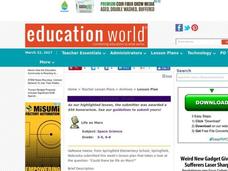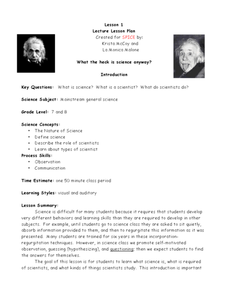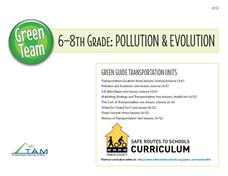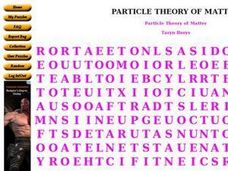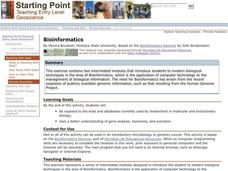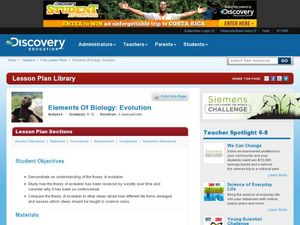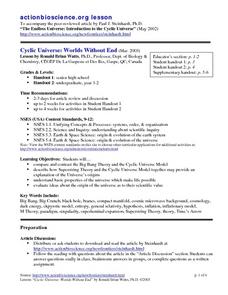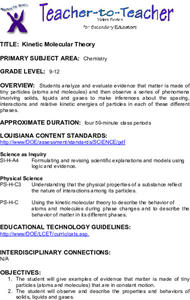Curated OER
Life on Mars
Students research the feasibility of life on Mars and debate what it would need in order to sustain life. They work in teams to predict, research, infer, and explain their theory using models they build.
PBS
Predicting/Making a Hypothesis
As an introduction to the hypothesis and testing method of investigation, young history detectives engage in a special investigation of a family artifact. After watching a short video that demonstrates the method, they develop a...
Curated OER
What the Heck Is Science Anyway?
Here is a 12-page outline of an introductory science lesson. The teacher lectures on what science is, the role of a scientists, different disciplines of science, and the impact of scientific discoveries. Detailed lecture notes are...
NASA
Discovering the Milky Way
What do you call a tiny collection of galaxies? A puny-verse! Young scholars graph data gathered by scientists studying Cepheids. They attempt to identify a relationship between the variables through standard and logarithmical graphing....
University of Georgia
Stoichiometry of S'mores
How fun would it be to teach the concept of stoichiometry while allowing your chemistry class to assemble a classic campfire treat? This fun and engaging activity allows pupils to explore the principles of the chemical theory while...
Virginia Department of Education
The Colligative Properties of Solutions
How can you relate colligative properties of solutions to everyday situations? Pupils first discuss the concepts of density, boiling and freezing points, then demonstrate how to accurately determine the boiling and freezing point of...
Channel Islands Film
Island Rotation: Lesson Plan 1
How do scientists provide evidence to support the theories they put forth? What clues do they put together to create these theories? After watching West of the West's documentary Island Rotation class members engage in a series of...
Curated OER
How Gear Systems Work: A Research Project
Students apply information regarding simple machines along with the math concept "ratios." The teacher introduces the concept that technology is the application of scientific knowledge and mathematics concepts to solve a problem. This is...
ARKive
Galapagos Conservation
The Galapagos Islands inspired Darwin to develop his theory of evolution. These wonderful islands will also be the topic of a lesson on habitat and conservation. In small groups, learners will collect and synthesize information regarding...
Safe Routes to School
Pollution & Evolution
Bring together a study of two major scientific topics with a instructional activity on the relationship between pollution and evolution. With the help of a PowerPoint presentation, hands-on activity. and class demonstration young...
Anglophone School District
Fluids: Force in Fluids
Discuss Archimedes' Principle and fluid forces with your young scientists as they describe the relationship between mass, volume, and density during a series of engaging activities. They use the Participle Theory of Matter to explore the...
New South Wales Department of Education
Photosynthesis
Venus fly traps photosynthesize and consume insects because the soil they live in does not provide enough nutrients. Scholars analyze historical scientific experiments to learn how scientists discovered photosynthesis. From their...
Curated OER
Born Gay
Is a person's sexual orientation determined at birth? With the informative website, scholars prepare for a debate about the topic. They learn the top pro and con arguments and read through a historical timeline of homosexuality. They...
Colorado State University
What Is Energy?
Don't let the energy of your classroom falter! Explore the scientific definition of energy through play. A hands-on lesson focuses on the change of energy from one form to another.
Curated OER
Evolution of Observation
Students develop an awareness of the evolution of the scientific method. They facilitate the student's knowledge of looking at variables from different perspectives. Students develop their abilities to defend their ideas with facts or...
Curated OER
Particle Theory of Matter
In this science word search worksheet, students identify and locate words in a puzzle that relate to particle theory of matter. There are 24 words to locate in the puzzle and spell correctly.
Curated OER
Bioinformatics
Students are exposed to the tools and databases currently used by researchers in molecular and evolutionary biology. They gain a better understanding of gene analysis, taxonomy, and evolution.
Curated OER
Elements Of Biology: Evolution
Students study the theory of evolution and examine why it is so controversial. In this biology lesson plan students view a video on evolution, research the theory of evolution on the Internet and complete an essay.
Curated OER
Cyclic Universe: Worlds Without End
Learners compare and contrast the Big Bang Theory and the Cyclic Universe Model. They explain basic properties of the univers which make life possible. They evaluate ideas about the origin of the universe as to their scientific value.
Curated OER
Evolution
Pupils research the theory of evolution and the controversy. In this evolution lesson students view a film on Charles Darwin then they write an essay about whether or not intelligent design should be taught in science class.
Curated OER
For The Birds
Seventh graders list the features of an ecosystem and identify local bird species. In this bird lesson students work in groups to formulate a hypothesis and test their theory by collecting and analyzing data.
Curated OER
Radiation Reassessed
Students investigate the dangers of radiation by exploring recent nuclear tragedies. In this scientific debate instructional activity, students define the idea of radiation "half life" and determine if low doses of radiation are truly...
Curated OER
Kinetic Molecular Theory
Students analyze and evaluate evidence that matter is made of tiny particles. They observe a series of phenomena involving solids, liquids, and gases to make inferences about the spacing, interactions and relative kinetic energies of the...
Curated OER
Number Theory and The Real Numbers
For this algebra worksheet, 9th graders define rational and irrational numbers and answer questions about properties of real numbers. There are 38 questions on this test.


